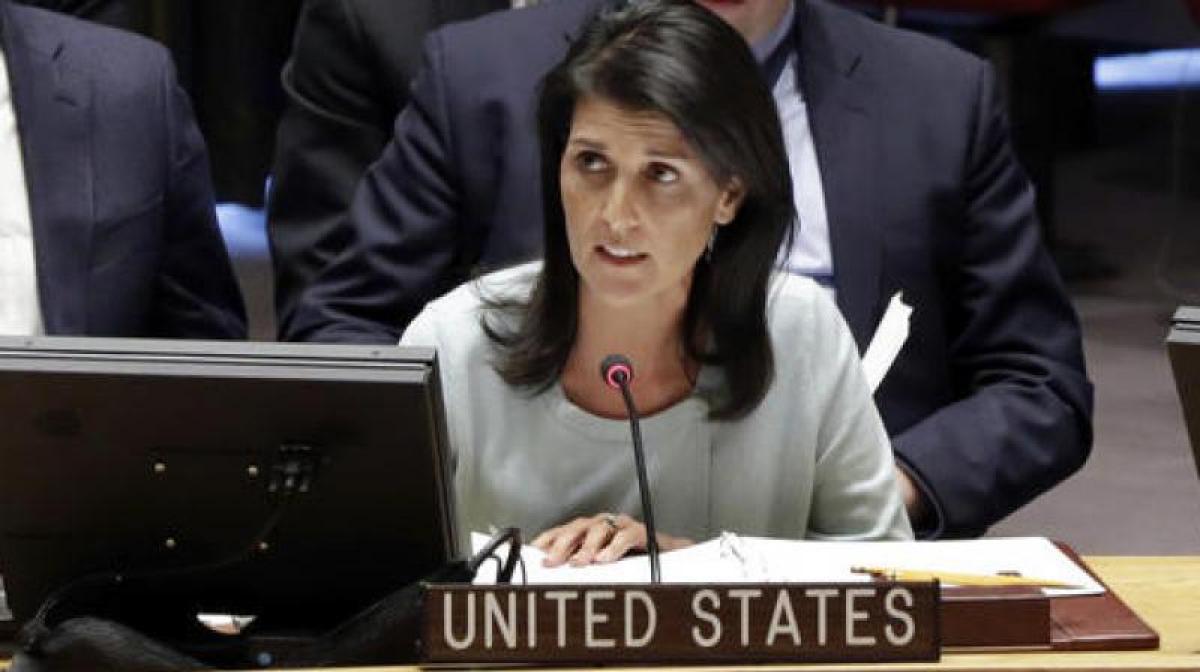Live
- Grand Celebration of MB Church Women’s Revival Conference The women of the MB Church
- Vemulawada Temple Development: Does the TG Endowments Minister want to write her own Agama Shastras for temples?
- Coop banks play key role in economic development
- TTD EO visits Sringeri Sarada Peetham
- Automobile loading using NMG rakes commences
- 555th Prakash Purab celebrated with gaiety
- Good news for Atmakur farmers
- High-risk aortic valve replacement surgery performed successfully
- HMWSSB MD holds review meeting on OTS-2024 scheme
- Dhobi Ghat assessed for potential to host sports complex
Just In

The United States has submitted a new North Korean sanctions resolution to the UN Security Council, toning down its demands less than 24 hours before a vote, diplomats said, as it sought to bring China and Russia on board.
The United States has submitted a new North Korean sanctions resolution to the UN Security Council, toning down its demands less than 24 hours before a vote, diplomats said, as it sought to bring China and Russia on board.
Washington has led the international drive to punish the rogue state after it detonated a nuclear device this month.
The US had originally pushed for a strict oil embargo, as well as a freeze on the assets of North Korean leader Kim Jong-Un.
But late Sunday, diplomats said the asset freeze had been dropped from the draft, and it now foresaw a progressive tightening of the oil taps, instead of something sudden and complete.
Among other concessions the new text also softens proposed restrictions on North Koreans working overseas, and on the inspection by force of ships suspected of carrying cargo prohibited by the UN.
Of five key original measures, a ban on textile exports from North Korea remained.
Britain and France -- permanent Security Council members along with the US, China and Russia -- have given Washington their unequivocal backing.
Francois Delattre, the French ambassador to the UN, told AFP: "Maximum pressure today in the form of sanctions is our best hope for promoting a political settlement tomorrow and the best antidote to risks of confrontation."
His British counterpart Matthew Rycroft added: "To give a chance for diplomacy to end this crisis, we need DPRK (North Korea) to change course now. That means the maximum possible pressure."
The sticking point will be opposition from Russia and China, the North's two main backers, who are wary of anything that might force the collapse of the regime and the resulting exodus of refugees.
In addition to bending somewhat to Moscow and Beijing, Washington has dangled the prospect of military action or cutting economic ties with countries that continue to have trade links with the North. Some 90 percent of North Korea's exports are destined for China.
Kim Hyun-Wook, professor at the state-run Korea National Diplomatic Academy, told AFP the Americans had softened their stance because it was vital to keep Moscow and Beijing on board.
"It is only possible to criticise and rebuke China and Russia for not enforcing the sanctions if they vote for it at the UN Security Council," he said.
"That's why I think the US tried to draw a UN sanctions resolution that China and Russia will participate in even if it is not fully satisfactory, which has led to the easing of the initially very strong draft proposal."
- 'Pay the price' -
Early Monday, North Korea said it would not accept any chastisement over its nuclear and missile programme, which it said is vital to stave off the threat of an American invasion.
If Washington does "rig up the illegal and unlawful 'resolution' on harsher sanctions, the DPRK shall make absolutely sure that the US pays due price," its foreign ministry said, in a statement published by the official KCNA news agency.
The North has a long history of making florid threats against Washington and its allies without following through on them.
"The forthcoming measures to be taken by the DPRK will cause the US the greatest pain and suffering it had ever gone through in its entire history," the ministry said.
"The world will witness how the DPRK tames the US gangsters by taking (a) series of action tougher than they have ever envisaged."
The expected vote later Monday comes after days of hurried diplomacy with Washington seeking to convince Russia and China -- veto-wielding members of the Security Council -- that Pyongyang's weapons advances cannot go unchecked.
Pyongyang has staged a series of missile tests in recent months, culminating in an intercontinental ballistic missile that appeared to bring much of the US mainland into range -- ramping up tensions and earning itself a seventh set of UN Security Council sanctions.
It followed up earlier this month with a sixth nuclear test, which it said was a hydrogen bomb small enough to fit onto a missile.
That September 3 detonation was the country's largest to date and prompted global outrage.
Monday's expected vote is seen as a key test of resolve for the council, who united last month to adopt a resolution intended to reduce the impoverished country's export earnings by up to a billion dollars.

© 2024 Hyderabad Media House Limited/The Hans India. All rights reserved. Powered by hocalwire.com







